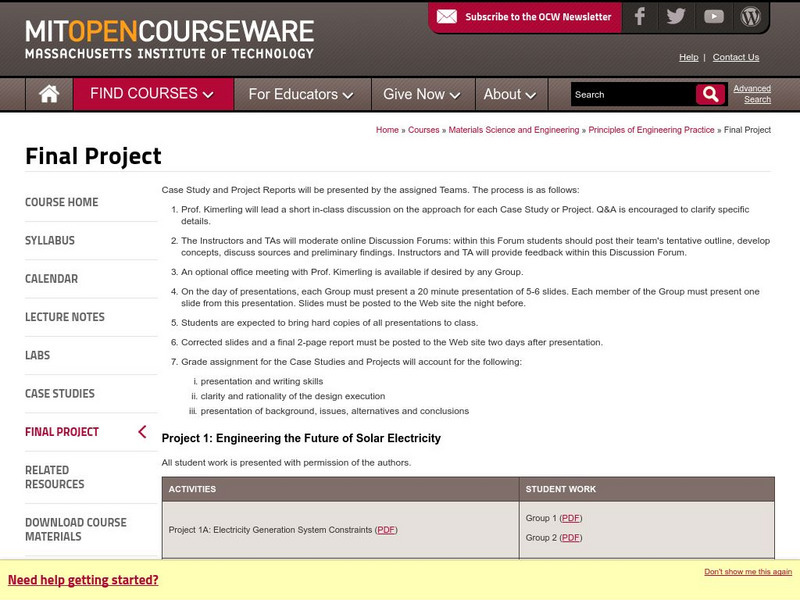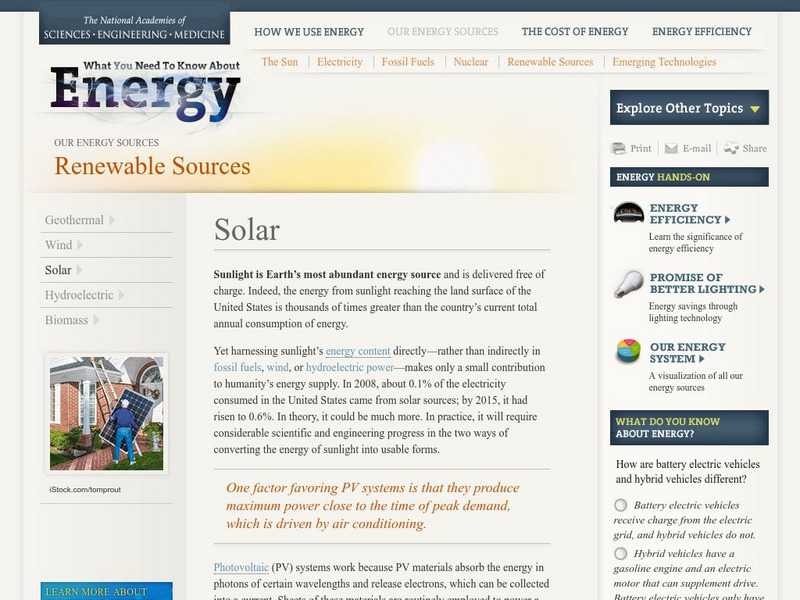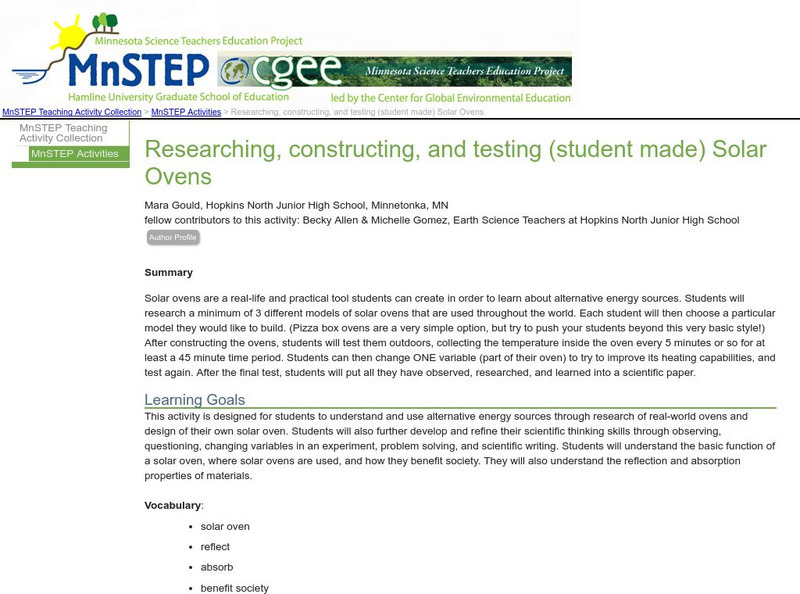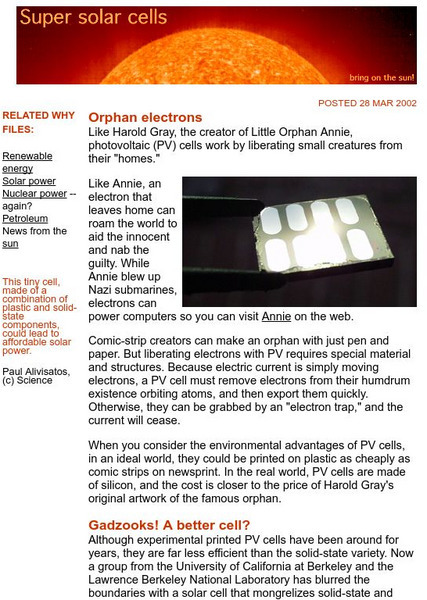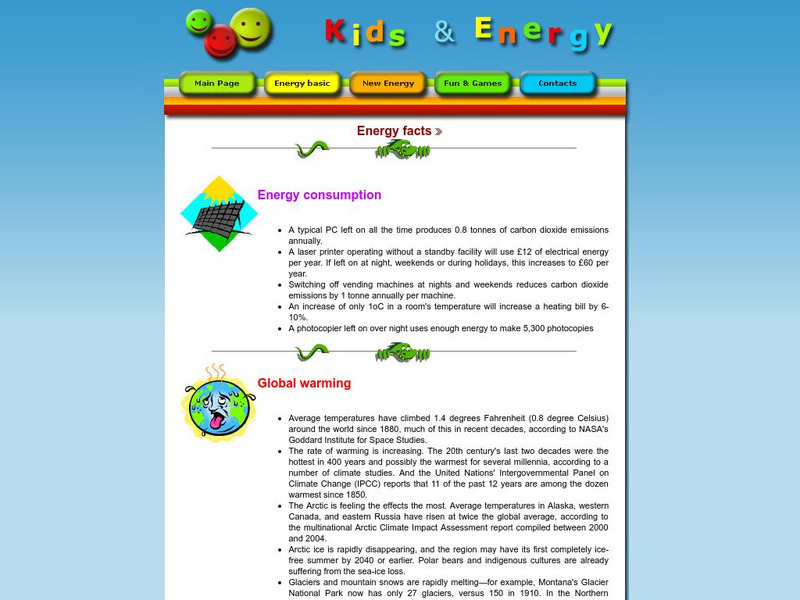Utah Education Network
Uen: Managing Heat
Understand the role of the sun as the source of heat and light for living things on earth.
Utah Education Network
Uen: Trb 4:1 Investigation 2 Why Does a Puddle Shrink?
Classroom activity helps students understand evaporation.
State Energy Conservation Office-Texas
State Energy Conservation Office: Learning About Photovoltaic Systems [Pdf]
Explains how photovoltaic systems work and how Texas homeowners are using them. Discusses how a homeowner can use solar energy and still be on the electricity grid system.
State Energy Conservation Office-Texas
State Energy Conservation Office: Passive Solar Design for Homes [Pdf]
Discusses different features that can be incorporated into a home's design in order to harness solar energy.
State Energy Conservation Office-Texas
State Energy Conservation Office: Cooking With the Sun [Pdf]
An introduction to solar cookers, how they are designed, and how to use one.
State Energy Conservation Office-Texas
State Energy Conservation Office: Solar Water Heaters [Pdf]
Explains the types of solar water heaters a home can have. These include a passive system, an active system, and a solar collector, as well as the need for a storage tank. It also gives tips on how to get the best use from a solar water...
State Energy Conservation Office-Texas
State Energy Conservation Office: Solar Electricity Works for Texas [Pdf]
Discusses photovoltaic energy systems and their many applications, e.g., in telecommunications, consumer products, space technology, solar lights, etc.
State Energy Conservation Office-Texas
State Energy Conservation Office: Solar and Electric Cars [Pdf]
Learn the differences between cars powered by different fuels. Looks at solar, electric, hybrid and gasoline-powered cars.
State Energy Conservation Office-Texas
State Energy Conservation Office: Electricity From the Sun [Pdf]
Discusses forms of renewable energy that rely on the sun. For example, wind is created when solar energy heats the air, and biomass is solar energy that has been stored in plants.
Other
Lincoln Public Schools: Applied Technology & Engineering: Solar Dragster Project [Pdf]
In this activity, students must design and build a solar-powered car that can complete a 20-meter racetrack (66 ft.) in the shortest amount of time over flat terrain. They learn about solar energy and car designs, and test their...
Concord Consortium
Concord Consortium: Stem Resources: Solar Oven
Use the sun's energy to cook an egg? Design, build and test a solar oven. Activity gives a procedure to build oven as well as questions to answer. Questions can be saved and graded by instructor.
Massachusetts Institute of Technology
Mit: Open Course Ware: Engineering the Future of Solar Electricity
Part of a materials science engineering course, a project through which students investigate the future of solar electricity by creating prototypes of solar cells. Students complete exercises in "project planning, analysis, design,...
National Academies of Sciences, Engineering, and Medicine
The National Academies: Renewable Sources: Solar
Solar energy is an appealing alternative to conventional sources of energy because it produces no greenhouse gases. An overview of its advantages and disadvantages is presented here.
Science Education Resource Center at Carleton College
Serc: Alternative Energy Debate
With a learning team, students choose an alternative energy source such as solar, wind, biofuel, geothermal or other form and research the pros and cons of that energy type. The team then splits into debate teams and draws straws to...
Science Education Resource Center at Carleton College
Serc: Mn Step: Researching, Constructing, and Testing (Student Made) Solar Ovens
For this science investigation, middle schoolers will research models of solar ovens, choose one design, and create it. Once built, they will test it outside and record the internal temperature at intervals. Next, they are to change on...
Science Education Resource Center at Carleton College
Serc: Economics of Installing Solar Pv Panels: Is It Worth It to the Individual?
Help determine the financial calculations involved in an actual solar photovoltaic system installed Denver, Colorado in 2013.
TryEngineering
Try Engineering: Solar Structures
During this lesson, students will construct a passive solar house from everyday items then explore how the sun's energy is used to heat and cool it.
TryEngineering
Try Engineering: Here Comes the Sun
Students work in teams to learn about solar panel design, simple circuits, and how solar energy is used to provide power to simple machines such as calculators.
University of Wisconsin
The Why Files: Power Plants
Photovoltaic technology is compared and contrasted to the natural phenomenon of photosynthesis. The means by which photocells harness solar energy is described and explained.
University of Wisconsin
The Why Files: Super Solar Cells
An understandable description of modern research that is currently being conducted to develop a more efficient photovoltaic (solar energy) cell. It also contains links to other pages on renewable energy sources.
Energy for Sustainable Development
Esd Bulgaria: Kids & Energy: Energy Facts
A collection of facts about energy use broken down into various topic areas, e.g., health impact of fossil fuels, transportation, energy consumption, alternative energies, etc.
Encyclopedia of Earth
Encyclopedia of Earth: Solar Radiation
Almost all of the energy that drives the various systems (climate systems, ecosystems, hydrologic systems, etc.) found on the Earth originates from the sun. Solar energy is created at the core of the sun when hydrogen atoms are fused...
TED Talks
Ted: Ted Ed: How to Fly Around the World Without Fuel
Imagine if we could fly day and night using only solar energy. The expertly engineered Solar Impulse plane is flying around the world delivering a powerful message: clean technologies can achieve the seemingly impossible. Powered by a...
TED Talks
Ted: Ted Ed: How Do Solar Panels Work?
The Earth intercepts a lot of solar power: 173,000 terawatts. That's 10,000 times more power than the planet's population uses. So is it possible that one day the world could be completely reliant on solar energy? Richard Komp examines...




